Where are the win10 boot menu settings?
php editor Xiaoxin is here to tell you that if you want to set up the startup menu in Win10, you can complete it in just a few simple steps. First, click the Start button in the lower right corner of the desktop and select "Settings." Next, click "Personalization" in the settings window and select "Start." In the Start menu settings, you can customize the style and layout of the startup menu, add or remove frequently used applications, and even pin folders to the startup menu. With simple settings, you can easily create your own personalized startup menu.
文| Bo Ge
If you don’t like the darkness, just make it more transparent

If you don’t like the darkness of the command prompt window , some fine-tuning can be done. Right-click the window's title bar and select Properties. In the "Command Prompt Properties" window that pops up, switch to the "Color" tab. You'll see an Opacity slider at the bottom. Press the left mouse button and drag the slider gradually to the left to make the window more and more transparent. But please note that the transparency can only be adjusted to a maximum of 30% (Figure 1).
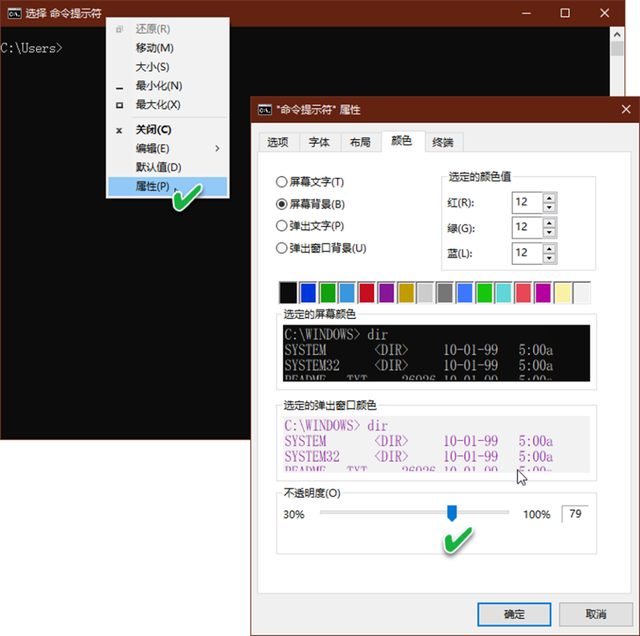
(Picture 1)
After the window is adjusted to transparent, you can see the content of the next layer without switching windows.
Make the command prompt window look like a document
We can adjust the settings to modify the background color and font color of the command prompt window as well as the display font and font size to make it more It is similar to the environment we usually use when editing documents.
In the "Color" tab in the "Properties" window, we can change the color of the background and font. For example, we can set the screen text to black and the screen background to light blue. If you are particular about color, you can also use three color values of red, green, and blue for color matching (Figure 2).
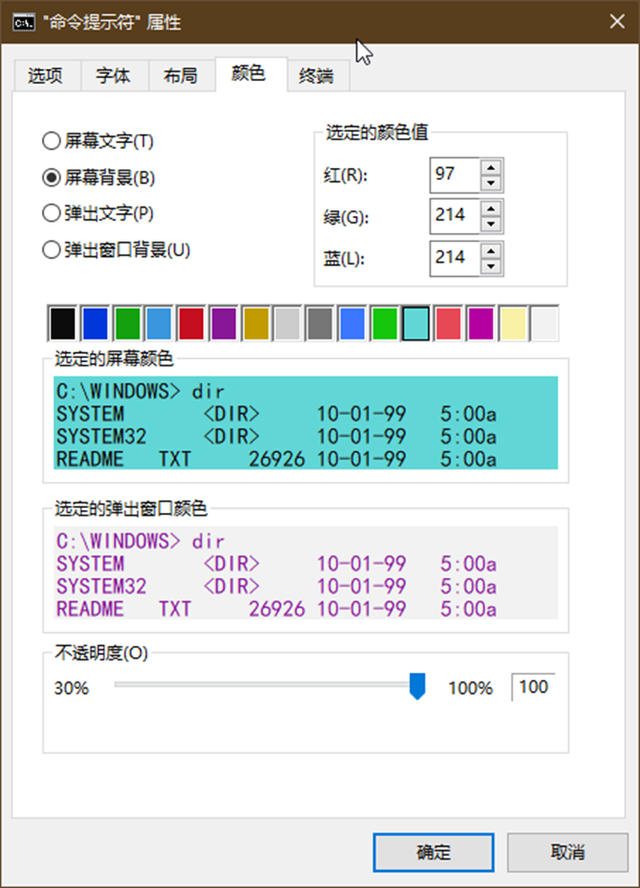
(Picture 2)
#The font type and font size are displayed through the "Font" and "Size" in the "Font" tab The font can be selected from the list, and the font can be selected from the English font library or the Chinese font library. After selection, it can be previewed from the lower pane (Figure 3).
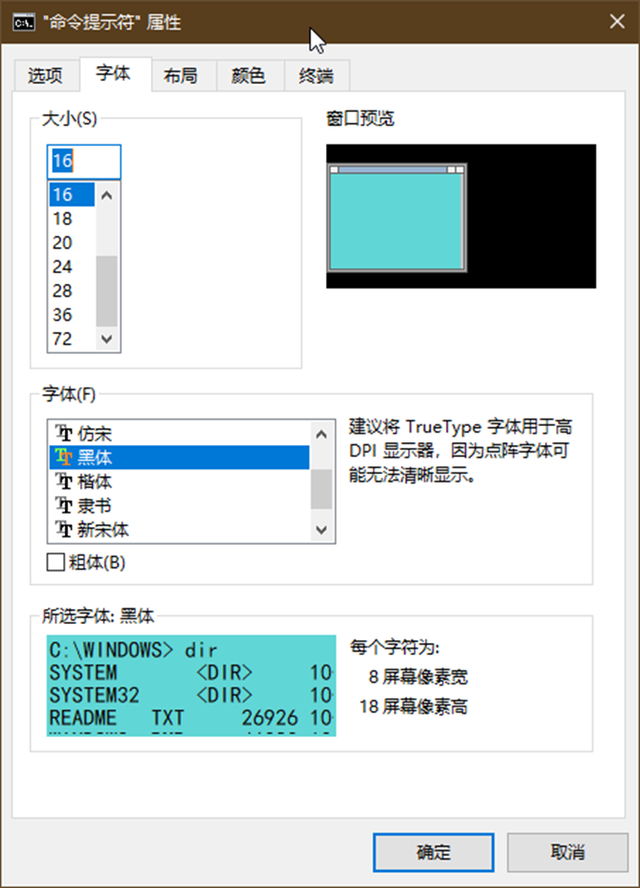
(Picture 3)
#The above settings will only be effective for this setting after confirmation. The next time you open the command prompt window, it will be valid again. will return to its original state. In order to continue using these settings, you can first select "Default" in the right-click menu of the title bar, then follow the above setting methods, and finally save the settings.
Let the open command prompt not take up too much of the desktop

The default size of the command prompt window is relatively large after it is opened. If we often only use some short commands, or want the window to take up less space and make the desktop simpler, then we can select the "Layout" tab in the "Properties" window mentioned above, and then set the width and height of the window. You can even set the coordinate position on the desktop after the window is opened (determined by the two parameters "left" and "top" of the distance from the screen) (Figure 4).
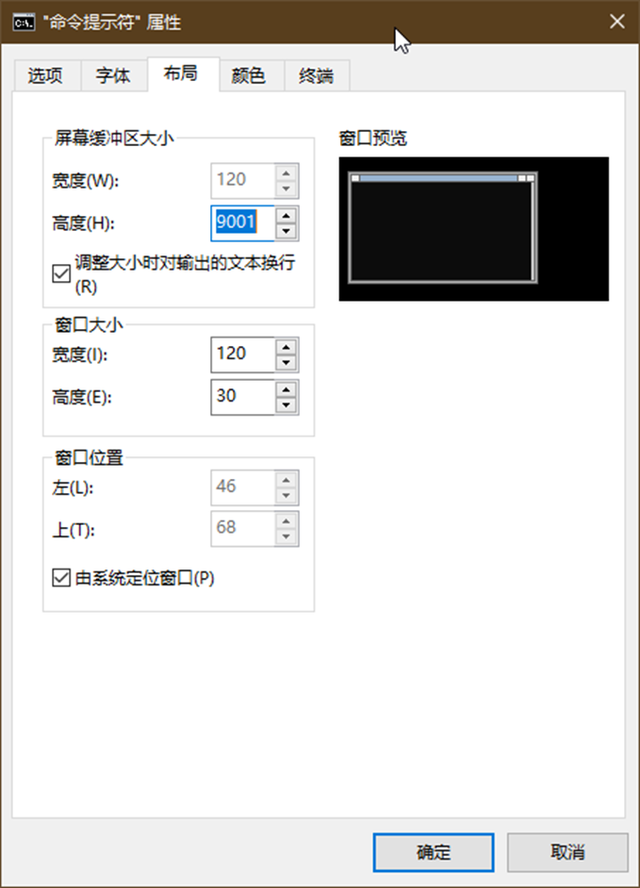
(Picture 4)
The administrator command prompt can also be started in "Run"

General For example, enter the "CMD" command in the search box of Windows 10 system to choose to boot to the command prompt or administrator command prompt window. However, according to the past usage habits in lower version systems, we often start the command prompt through the "Run" box, and the "Run" box cannot directly select to enter the administrator command prompt. In fact, if you suddenly remember that you want to start the administrator command prompt window when entering the "Run" box, you do not need to exit "Run" and find another way. You only need to use one of the two sets of shortcut keys to start the window. Open the administrator command prompt in the dialog box.
First, after entering the "CMD" command in the "Run" box, press the "Ctrl Shift Enter" key combination. In addition, you can also press the "Ctrl Shift" key combination after entering the "CMD" command, and then click the "OK" button in the dialog box (Figure 5).
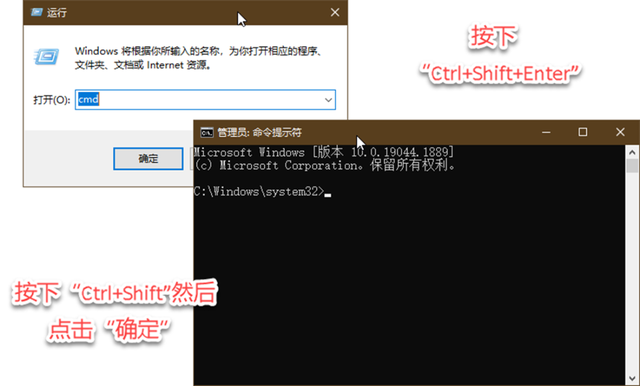
(Picture 5)
Start the command prompt when you cannot enter the system
When the system cannot boot to the desktop, if you need to enter the command prompt window to maintain the system or access files, you can first prepare the Windows 10 installation flash disk and set the boot device in the computer UEFI/BIOS boot menu to this flash drive. After starting the computer with this disk, wait for the installation interface to load. After selecting the language and keyboard, do not click Install Now. Instead, click "Repair Computer" in the lower left corner of the interface or press the "R" key on the keyboard.
Next select "Troubleshooting", and then the "Advanced Options" window will appear, in which you will see the "Command Prompt" option. Click this item to enter the Command Prompt window (Figure 6) .
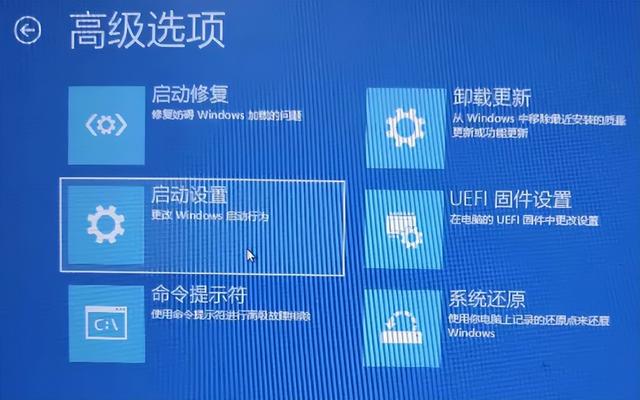
(Figure 6)
Use Group Policy to “resuscitate” the command prompt

If the command The prompt is disabled and cannot be started. We can easily solve this problem by using the Group Policy Editor. First, enter "Group Policy" in the search box on the taskbar, select "Edit Group Policy", and start the local Group Policy Editor. Then expand to "User Configuration → Administrative Templates → System" in its window and find "Block Access to Command Prompt" in the right pane (Figure 7). Double-click this item to enter the configuration window and change the configuration option to "Disabled" (Figure 8). CF
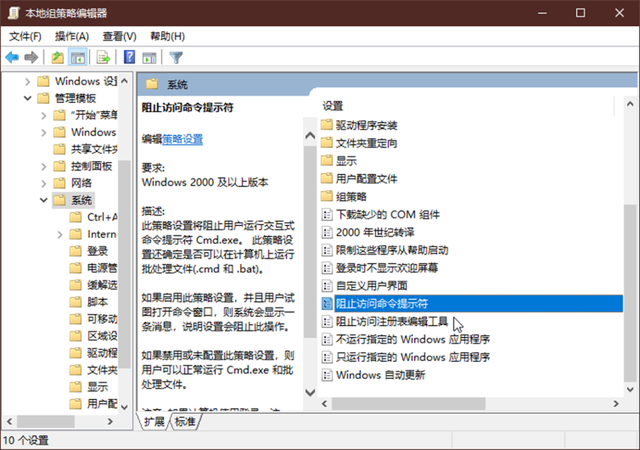
(Picture 7)
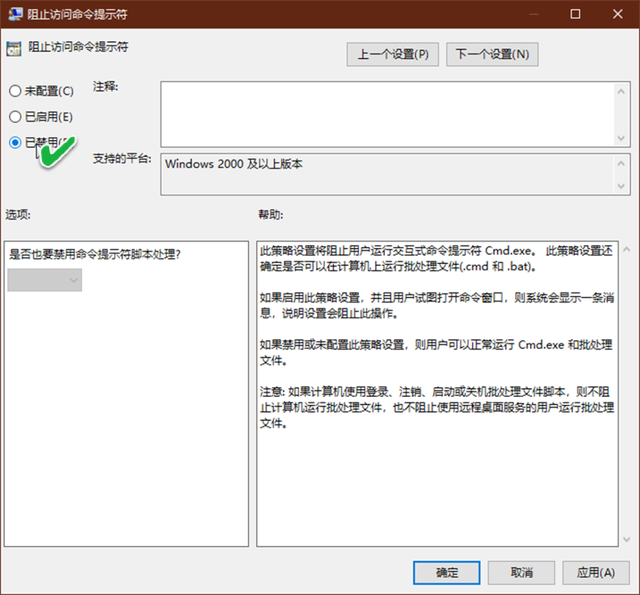
(Picture 8)
The original article was published in the 19th issue of "Computer Enthusiast" published on October 1, 2022
The above is the detailed content of Where are the win10 boot menu settings?. For more information, please follow other related articles on the PHP Chinese website!

Hot AI Tools

Undresser.AI Undress
AI-powered app for creating realistic nude photos

AI Clothes Remover
Online AI tool for removing clothes from photos.

Undress AI Tool
Undress images for free

Clothoff.io
AI clothes remover

Video Face Swap
Swap faces in any video effortlessly with our completely free AI face swap tool!

Hot Article

Hot Tools

Notepad++7.3.1
Easy-to-use and free code editor

SublimeText3 Chinese version
Chinese version, very easy to use

Zend Studio 13.0.1
Powerful PHP integrated development environment

Dreamweaver CS6
Visual web development tools

SublimeText3 Mac version
God-level code editing software (SublimeText3)

Hot Topics
 1386
1386
 52
52
 System Restore prompts that you must enable system protection on this drive
Jun 19, 2024 pm 12:23 PM
System Restore prompts that you must enable system protection on this drive
Jun 19, 2024 pm 12:23 PM
The computer has a restore point, and when the system is restored, it prompts "You must enable system protection on this drive." This usually means that the system protection function is not turned on. System protection is a feature provided by the Windows operating system that can create system restore points to back up system files and settings. That way, if something goes wrong, you can revert to a previous state. When the system fails and you cannot enter the desktop to start it, you can only try the following method: Troubleshooting-Advanced Options-Command Prompt Command 1 netstartvssrstrui.exe/offline:C:\windows=active Command 2 cd%windir%\system32 \configrenSYSTEMsy
 What should I do if win10 does not switch users? Win10 login interface does not have the option to switch users. Solution
Jun 25, 2024 pm 05:21 PM
What should I do if win10 does not switch users? Win10 login interface does not have the option to switch users. Solution
Jun 25, 2024 pm 05:21 PM
A problem that Windows 10 users may encounter is that they cannot find the switch user option on the login interface. So what should I do if there is no switch user option on the win10 login interface? Let this site give users a detailed explanation of the problem of not switching user options in the win10 login interface. Detailed solution to the problem of switching user options on the Win10 login interface: Check user account settings: First, make sure you have multiple user accounts on your computer and that these accounts are enabled. You can check and enable the account by following these steps: a. Press Win+I keys to open Settings and select "Accounts". b. Select "Family & Others" or &ld in the left navigation bar
 How to permanently turn off real-time protection in win10? How to disable real-time protection function in win10 computer 0
Jun 05, 2024 pm 09:46 PM
How to permanently turn off real-time protection in win10? How to disable real-time protection function in win10 computer 0
Jun 05, 2024 pm 09:46 PM
Although the comprehensive anti-virus software that comes with Windows 10 system can continuously protect the security of your personal computer, sometimes it may also affect certain downloaded files. For some users, it may be more appropriate to temporarily turn off the real-time protection function. But many users don’t know how to permanently turn off the real-time protection feature on win10 system. 1. First, press the "Win+R" keys to open the run window, enter the "gpedit.msc" command to open the local Group Policy Editor interface; 2. Then, in the opened interface, click "Computer Configuration/Administrative Templates/ Windows Components/MicrosoftDef
 How to restore the default wallpaper in win10? One trick to quickly restore the default wallpaper in Windows 10 system
Jun 02, 2024 pm 02:07 PM
How to restore the default wallpaper in win10? One trick to quickly restore the default wallpaper in Windows 10 system
Jun 02, 2024 pm 02:07 PM
In Windows 10 system, if you want to return to the system default wallpaper, you can follow the following steps: 1. Right-click a blank space on the desktop and select Personalize in the pop-up menu. 2. This will open the Personalization window in Settings. In the left menu, click Background. 3. Under the "Background" settings, find and click the drop-down menu next to "Choosepicture", and then select Windows Default (Windows Default) or directly select a picture that looks like the default wallpaper in the picture preview below ( if there are multiple options). 4. If your system has multiple versions
 Windows cannot start the Windows Audio service Error 0x80070005
Jun 19, 2024 pm 01:08 PM
Windows cannot start the Windows Audio service Error 0x80070005
Jun 19, 2024 pm 01:08 PM
The guy's computer appears: Windows cannot start the WindowsAudio service (located on the local computer). Error 0x8007005: Access denied. This situation is usually caused by user permissions. You can try the following methods to fix it. Method 1: Modify the registry to add permissions through batch processing, create a new text document on the desktop, save it as .bat, and right-click the administrator to go far. Echo==========================EchoProcessingRegistryPermission.Pleasewait...Echo================== ========subinacl/subkey
 What should I do if Win10 takes a screenshot and crashes? How to solve the problem of Win10 flashing and then disappearing after taking a screenshot?
Jun 02, 2024 pm 12:48 PM
What should I do if Win10 takes a screenshot and crashes? How to solve the problem of Win10 flashing and then disappearing after taking a screenshot?
Jun 02, 2024 pm 12:48 PM
There are many reasons why the screenshot disappears after taking a screenshot in Win10. Users can first check the screenshot save location or adjust the screenshot settings, or check the animation effect to check it. If it really doesn't work, you can also choose to update the driver and operating system to perform the operation. Let this website carefully introduce to users the analysis of the problem of Win10 disappearing after taking a screenshot. Analysis of the problem after win10 takes a picture and it flashes and disappears 1. Check where the screenshot is saved: When you use the Win+PrtSc (PrintScreen) key combination to take a screenshot, the screenshot is usually saved in the C:\Users\YourUsername\Pictures\Screenshots folder. please
 What to do if the Win10 Task Manager crashes? How to fix the Win10 Task Manager crash?
Jun 25, 2024 pm 04:31 PM
What to do if the Win10 Task Manager crashes? How to fix the Win10 Task Manager crash?
Jun 25, 2024 pm 04:31 PM
Hello everyone, have you ever encountered the situation where the Windows 10 Task Manager keeps crashing? This function helps us a lot, allowing us to quickly see all running tasks, which is very convenient to use, right? However, some friends said that they encountered this problem and didn’t know how to solve it, so let me share with you the specific solution! Solution to Win10 Task Manager crash 1. First, press and hold the "Win" + "R" keys on the keyboard to open Run, enter "regedit" and press the Enter key. 2. Expand the folders and find "HKEY_CURRENT_USERSoftwareMicros
 How to turn off popular searches in Windows 10 system? List of methods to close popular searches in Windows 10 system
Jun 03, 2024 pm 08:46 PM
How to turn off popular searches in Windows 10 system? List of methods to close popular searches in Windows 10 system
Jun 03, 2024 pm 08:46 PM
In win10 system, hot search is one of the more practical methods, but sometimes it can cause certain troubles. So how to turn off hot search? Let’s take a look below! Step 1: Open the Settings app First, click on the Windows icon in the lower left corner of the screen and select the Settings app. Step 2: Enter "Personalization" settings In the "Settings" app, click the "Personalization" option. Step 3: Select the “Search” option In the “Personalization” settings, select the “Search” option. Step 4: Turn off popular searches. In the "Search" option, find the option "Show popular searches in search" and turn it off. Professional Tool Recommendation 1. Xiaozhi Soso Xiaozhi Soso—Quick Search and One-Click Positioning—Professional Computer Search Tool




